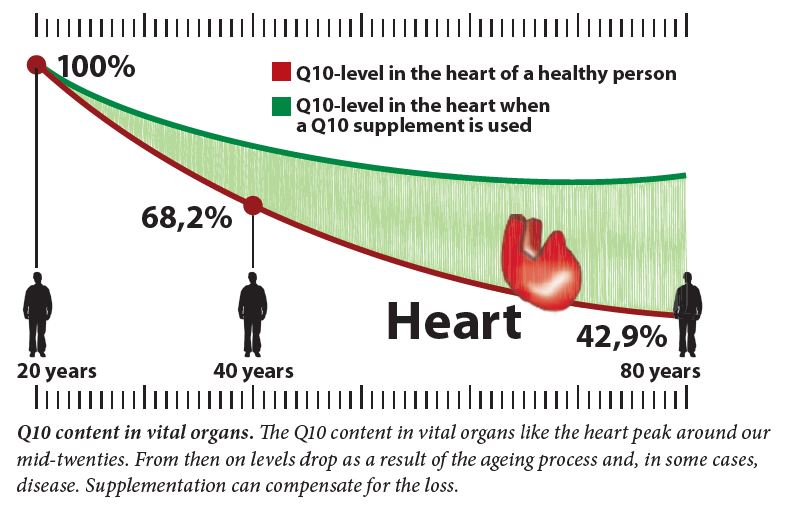“Recharging” an energy-starved heart
Several published studies show that patients with chronic heart failure (CHF) benefit from taking supplements of the vitamin-like compound coenzyme Q10. The treatment enables their heart muscle to contract with greater force, their exercise tolerance increases, and they can generally enjoy life in a different way because they are less likely to feel the limitations of their condition. CHF patients are normally categorized according to the New York Heart Association (NYHA) Functional Classification (see below), which places patients in one of four groups based on how limited they are during physical activity (in terms of breathing, shortness of breath, chest pain etc.). There are documented examples of CHF patients who have improved 1-2 NYHA classes as a result of receiving coenzyme Q10 supplementation.
Sources: “Investigation of Pycnogenol(R) in combination with coenzymeQ10 in heart failure patients (NYHA II/III),” Belcaro G, Cesarone MR, et al, Panminerva Med, 2010 June; 52(2 Supple 1): 21-5
“Supplemental ubiquinol in patients with advanced congestive heart failure”, Langsjoen PH, Langsjoen AM.

- No symptoms and no limitations in ordinary physical activity, e.g. shortness of breath when walking, climbing stairs, etc.
- Mild symptoms (mild shortness of breath and/or angina) and slight limitation during ordinary activity
- Marked limitation in activity due to symptoms, even during less-than-ordinary activity, e.g. walking short distances (20-100 meters). Comfortable only at rest.
- activity, e.g. walking short distances (20-100 meters). Comfortable only at rest. IV Severe limitations. Experience symptoms even while at rest. Mostly bed-bound patients.
Reference: The Criteria Committee of the New York Heart Association. Nomenclature and Criteria for Diagnosis of Diseases of the Heart and Great Vessels. 9th ed. Boston, Mass: Little, Brown & Co; 1994:253-256.
How coenzyme Q10 may reduce inflammation
It is well established that coronary artery disease (CAD) is associated with inflammatory processes and coenzyme Q10 may hold a promising role in reducing this inflammation by way of different mechanisms. A group of Taiwanese researchers from Chung Shan Medical University and the Intensive Care Unit of Taichung Veterans General found in a recent study that the nutrient successfully lowered levels of the inflammatory marker IL-6 (interleukin-6) in patients who were given a daily dose of 150 mg coenzyme Q10 for 12 weeks. The study was conducted on 40 patients with coronary artery disease who were randomly assigned to three groups: a placebo group, a 60 mg/day coenzyme Q10 group, or a 150 mg/day coenzyme Q10 group. All groups followed the prescribed intervention for 12 weeks.
Levels of inflammatory markers, including IL-6, C-reactive Protein, and homocysteine, plus superoxide dismutase (an endogenous antioxidant enzyme) were measured before and after. Subjects in the 150 mg coenzyme Q10 group had significantly lower levels of IL-6 and malondialdehyde (a marker of lipid peroxidation). At the same time, subjects in both Q10 groups had increased superoxide dismutase activity, which is a sign of improved antioxidant protection. On behalf of these findings, the researchers conclude that coenzyme Q10 taken at a dosage of 150 mg/day appears to decrease the inflammatory marker IL-6 in patients with coronary artery disease.
Source: Nutrition. 2012 Feb 16. [Epub ahead of print]
